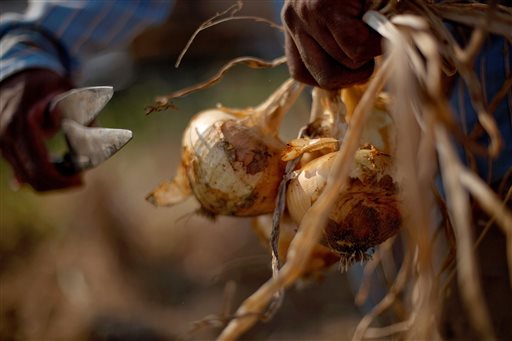SAVANNAH, Ga. - No Vidalia onion will be harvested before its time. So says the agricultural commissioner who claims farmers should face fines for shipping one of Georgia's premier crops too early, potentially threatening their renowned sweet, delectable taste.
But one of the state's most prominent farmers is going to court to fight the new rules, claiming the commissioner is overstepping his bounds and that onions are being shipped only when they're ready and only after federal inspectors give the high sign.
Gary Black, the state's Republican agriculture commissioner, says early sales of unripe onions are threatening the Vidalia's reputation as a rare onion that's so sweet it can be eaten raw like an apple. Black spent the past 18 months working with farmers on a new rule that prohibits packaging Vidalia onions for shipping before the last full week of April.
A judge in Atlanta struck down the rule last month, saying Black overstepped his authority trying to protect the $150 million onion crop. Still, the commissioner says he still plans to enforce the restriction while the state appeals. Any farmer who ships onions before the official start date next Monday faces fines of up to $5,000 per bag or box, and could be banned from selling onions under the Vidalia trademark in the future
As a grower with roughly 3,000 acres invested in Vidalia onions, Delbert Bland insists his three decades in the business make him - and not the agriculture commissioner or other farmers - the best judge of when his onions are ready to come out of the ground. He won the first round of court battles with help from Atlanta attorney Mike Bowers, Georgia's former attorney general. Now they're scheduled to return to court Tuesday on Bland's home turf of Tattnall County, where Bland is asking a judge to stop Black from enforcing the packaging date until the appeals get resolved.
"I've been doing this for 30 years and I've tried to be respectful and nice about it," Bland said Monday. "But he's gone way beyond his duties as commissioner of agriculture."
Vidalia onions shipped across the world come from just 20 counties in southeast Georgia, where low-sulfur soil and other factors are credited with giving them a sweetness that's been touted by farmers since the 1930s. About 200 million pounds of the onions come out of the ground in this region every year.
State and federal laws protecting the Vidalia onion trademark have been in effect since the late 1980s. Georgia law gives the agriculture commissioner powers that include setting a shipping date in consultation with farmers. But it also allows growers to ship onions earlier if federal inspectors give them a U.S. 1 grade.
Black says earlier sales have given rise to complaints of slipping quality, that the onions aren't as sweet or as firm as they should be and half a shorter shelf life. The commissioner said he spoke to a group of accountants three weeks ago and one of them asked: "When are you going to do something about these Vidalia onions? Because they're nothing like they used to be 20 years ago."
Working with Vidalia growers, the state agriculture department developed a rule that virtually eliminated early shipments by stating no onions could be packed for sale before the last full week in April, unless there was a consensus crops had ripened sooner. Many growers supported the move, saying it was needed to protect the crops' quality.
"We believe this is going to work," Black said in a phone interview Monday. "There may be some nuances that could be altered in the rule in the future, but our commitment to the growers was to help them solve this issue. We have a major responsibility to ensure the consumer can trust in that trademark."
Bland said he was already boxing onions and meeting with U.S. Department of Agriculture inspectors Monday for his first shipment of the year.
He said he typically ships up to 150,000 boxes during the first week of the season, and being prohibited from selling onions he believes are ready for market would cost him serious money.
"If you went through a lifetime to develop a product that people would want, who would lose the most if you shipped it immature?" Bland said. "Onions are the type of commodity that, when they're mature and ready, you've got to harvest them. If you leave them in the field, they're going go bad."

